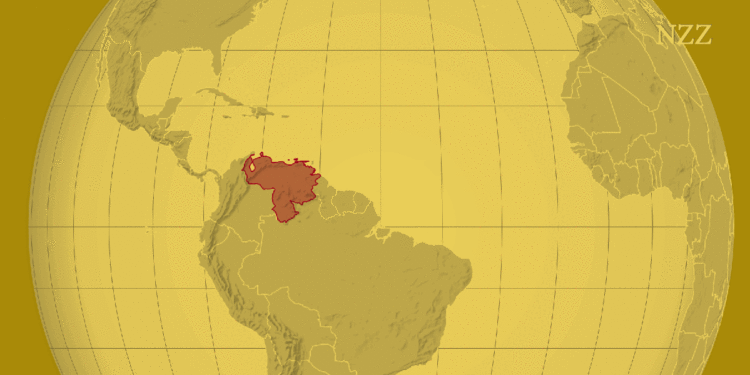There is no war in Venezuela, but economic collapse and political upheaval have driven millions of people to seek better lives elsewhere. The resulting crisis is affecting neighboring countries and even the U.S. elections.
Despite international criticism and nationwide protests, Venezuela’s President Nicolás Maduro insists that he won the national election held on July 28. The fact that the dictator is not stepping aside could be the final straw for many Venezuelans. According to a survey conducted in June, as many as 5 million people were at that time considering fleeing the country if Maduro did not step down.
The Latin American country has already been experiencing a mass exodus. According to the U.N. Refugee Coordination Office for Venezuela, 7.7 million Venezuelans have left their homeland since Maduro took office in 2013, which corresponds to around one-quarter of the total population. This means that more people have left Venezuela than have fled from Syria or Ukraine, where wars are raging.
The Andrés Bello Catholic University in Caracas has been collaborating with UNHCR, the U.N. refugee agency, to investigate the living conditions of Venezuelan emigrants since 2017. According to this National Survey on Living Conditions, known as the ENCOVI studies, people are fleeing the once-prosperous oil state primarily because of the catastrophic economic environment. In recent years, the country’s inflation rate has routinely been the world’s highest. More than half of Venezuela’s population lives under conditions of extreme poverty, and intensifying political repression is exacerbating the situation.
Millions of men and women of working age have consequently fled the country.
In the early years, the emigrant population skewed toward highly educated people. However, according to the ENCOVI figures, people with no more than a secondary education today constitute the majority of the emigrants. For them, too, the prospects abroad are better than in their home country.
Neighboring countries taking in most migrants
The unstable situation in Venezuela is a particular concern for its neighboring countries. Colombia alone has taken in almost 3 million migrants from Venezuela over the last 10 years, and a further 3 million Venezuelans have found refuge in Peru, Brazil or Chile.
The U.S. and Spain, the country’s former colonial power, are the main destination countries outside Latin America. Well-educated Venezuelans in particular have tended to migrate to these countries. According to figures from last year’s ENCOVI study, 56% of Venezuelans in Spain and the U.S. claim to have a university degree.
The situation is different in neighboring Latin American countries, where many Venezuelans with lower levels of educational attainment have found refuge. Neighboring countries initially showed solidarity with these populations. However, their situation deteriorated dramatically at the start of the COVID-19 crisis in 2020. Many lost their jobs and access to basic services. The frequency of xenophobic attacks also increased, as emigrants were blamed for the spread of the virus on the continent.
Migration is a hot topic in the U.S. election campaign
Some of the Venezuelan emigrants therefore sought to move on to the United States, but visa restrictions in Mexico and other Central American countries made the legal route north considerably more difficult. As a result, the number of migrants crossing the dangerous Darién jungle between Colombia and Panama tripled. In 2023 alone, more than 500,000 people attempted this dangerous and expensive route. In the last two years, the majority of these migrants have come from Venezuela.
The influx not only reached America’s southern border with Mexico, but was also felt in major cities such as New York, Washington, D.C., and Chicago. There, too, security forces, emergency shelters and aid services soon reached their capacity limits, triggering a political crisis in the United States.
The Republicans blame the policies of President Joe Biden and Vice President Kamala Harris for the rise in migration figures. They argue that legalization and easier access to legal migration routes for Venezuelans have created additional incentives for even more migration.
On several occasions, the U.S. government made it easier for Venezuelans who were already in the country to access the labor market, and expanded access to residence permits. In October 2022, however, the U.S. also concluded a repatriation agreement with Mexico for illegal immigrants, which, among other provisions, stipulated that a maximum of 30,000 Venezuelans per month could enter the U.S. without being deported. Nevertheless, the number of migrants attempting to cross U.S. borders rose to a new high last year.
For their part, Republicans advocate a tough policy of deterrence, which includes the completion of the border wall once promised by Donald Trump as well as the mass deportations that he has pledged to implement. However, Maduro’s regime in Venezuela has for years been refusing to take back citizens who have emigrated.
Fewer illegal immigrants, but above all fewer immigrants
Given the steady flow of Venezuelan emigrants, other destination countries such as Peru, Chile and Spain are also focusing on bringing them out of illegality. The aim is for migrants to establish themselves more quickly in the labor market, overcome insecure living conditions, and be less dependent on state or humanitarian support.
In the U.S. and Spain, nearly 50% of migrants from Venezuela have either a permanent residence permit or citizenship. In most of the main destination countries, however, the majority of Venezuelans are still living illegally, with a temporary residence permit or with unresolved status.
Following the events surrounding the presidential election at the end of July, the situation is likely to become even more acute. Venezuela’s neighboring countries are already reporting thousands of border crossings every day. Chile’s President Gabriel Boric has already called for the affected countries to agree on admission quotas in order to avoid an emergency situation.
U.S. President Biden has also responded. At the beginning of August, the outgoing U.S. head of state announced that he would temporarily suspend a program facilitating the admission of Venezuelan migrants.
This was Biden’s reaction to Maduro’s stubbornness in refusing to leave office. However, August through October are also the months in which the most border crossings to the U.S. have tended to take place. The announcement thus comes just in time for a crucial phase of the election campaign, in which the issue of migration on the southern border will play an important role.
Julia Monn: Text and data
Olivia Meyer and Cian Jochem: Map and illustration
Latest articles
Global reporting. Swiss-quality journalism.
In today’s increasingly polarized media market, the Switzerland-based NZZ offers a critical and fact-based outside view. We are not in the breaking-news business. We offer thoughtful, well-researched stories and analyses that go behind the headlines to explain relevant events in the U.S., in Europe and worldwide. To produce this work, the NZZ maintains an industry-leading network of expert reporters around the globe who work closely with our main newsroom in Zurich.
Sign up for our free newsletter or follow us on Twitter, Facebook or WhatsApp.
Source link : http://www.bing.com/news/apiclick.aspx?ref=FexRss&aid=&tid=66d031c52f8244bfb7be5bc71910493c&url=https%3A%2F%2Fwww.nzz.ch%2Fenglish%2Fvenezuelas-mass-exodus-is-unparalleled-worldwide-ld.1845863&c=300068594685103405&mkt=en-us
Author :
Publish date : 2024-08-28 13:00:00
Copyright for syndicated content belongs to the linked Source.







